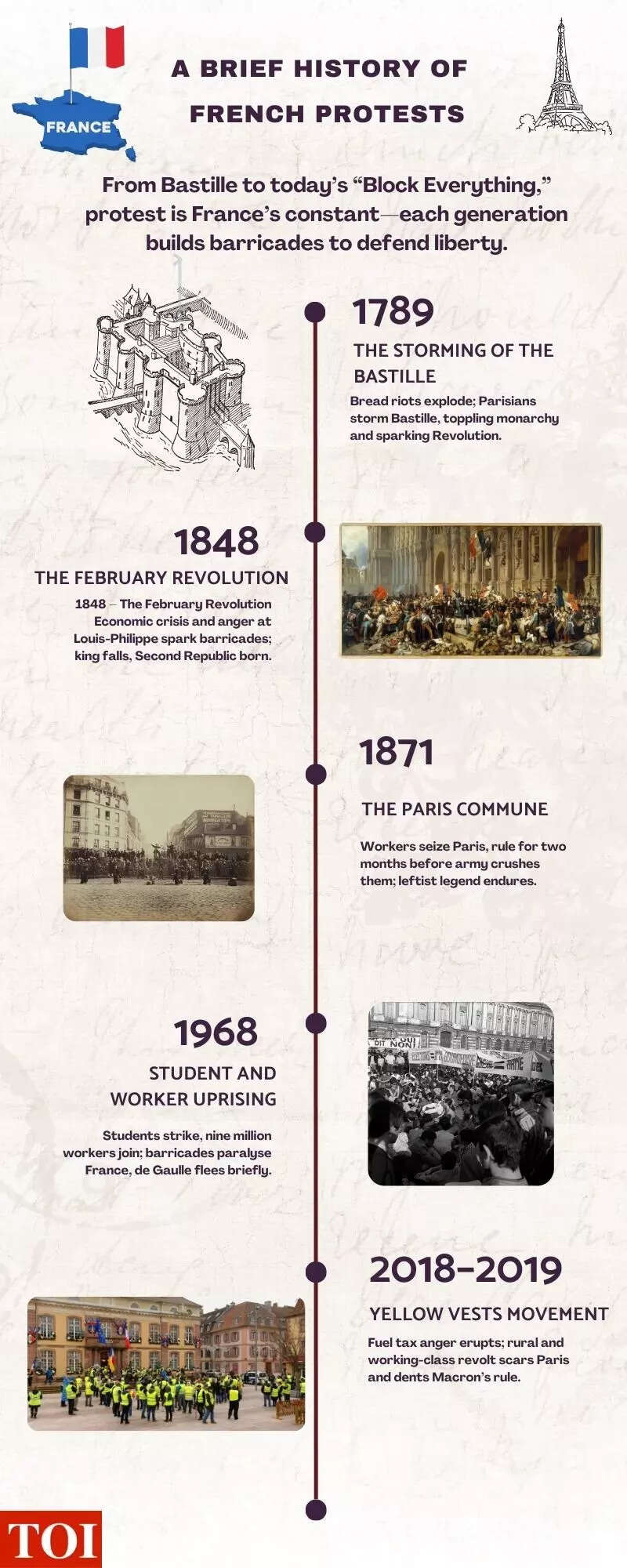ARTICLE AD BOX

Protesters of the the "Block Everything" movement march during a rally in Strasbourg, eastern France, Wednesday, Sept. 10, 2025. (AP Photo/Pascal Bastien)
“You don’t arrest Voltaire.” With that quip, French President Charles de Gaulle brushed off calls to jail philosopher Jean-Paul Sartre during the May 1968 uprisings. Even De Gaulle, architect of France’s hyper-presidential Fifth Republic, knew that in his country, rebellion isn’t crime—it’s heritage.
You can gas the streets, baton-charge students, arrest militants by the hundreds. But you can’t arrest the idea of Voltaire, because in France, dissent itself is sacrosanct.And here we are agian. This September, Paris burned, Rennes saw a bus ablaze, trains were halted in the southwest, and riot police clashed with demonstrators under the banner of “Bloquons Tout”—the “Block Everything” movement. Over 200 arrests on the first day, despite Macron deploying an astonishing 80,000 police nationwide.
Interior Minister Bruno Retailleau accused the protestors of trying to create “a climate of insurrection.
” To which the French reply: Mais bien sûr.
Bayrou Falls, Macron Stumbles
The immediate spark was political. Prime Minister François Bayrou, Macron’s third PM in twelve months, gambled on an austerity budget: freezing pensions, scrapping two public holidays, slashing €44 billion in spending. He lost a parliamentary confidence vote, resigned, and left Macron scrambling to install Sébastien Lecornu, the loyal defence minister, as France’s fourth prime minister in a year.
If the Élysée thought this game of musical chairs would pacify the nation, the streets begged to differ. Protesters waved placards: “The fall of the government is good, but insufficient.” Rail unions said openly: Bayrou may be gone, but the cuts are still coming. In Paris, they lit barricades; in Nantes, burning tires blocked roads; at Gare du Nord, a thousand tried to storm the station before police beat them back. By nightfall, garbage bins smouldered across the capital, commuters trudged through tear gas, and Macron’s presidency looked weaker than ever.
Liberté, Égalité, Protestation
To outsiders, French unrest looks like national sport. Britons queue politely; Germans file petitions; Americans storm Capitol buildings once a century. The French? They storm everything, everywhere, all at once—palaces, prisons, rail hubs, fuel depots, even tennis stadiums if they must. From medieval charivari to May ’68, the French believe protest isn’t disruption but civic duty.And why not? Protest works here. The 40-hour work week, the right to unionize, pension reforms withdrawn in 1995, student reforms scrapped in 2006—each carved out by street fury.
The lesson taught generation after generation is simple: the ballot box chooses rulers, but the barricade keeps them honest.Victor Hugo wrote Les Misérables not as fiction but as civic catechism. Schoolchildren recite La Marseillaise, a national anthem that exhorts them to water fields with tyrants’ blood. By the time they’re university students, manning barricades in the Latin Quarter feels less like rebellion than fieldwork for citizenship.So when today’s protesters chant against Macron, they’re not deviants. They’re heirs. They’re standing in a tradition that runs from the Bastille to the boulevards, a genealogy of rage that defines France itself.
“Let Them Eat Cake” Syndrome
The French Revolution of 1789 remains the blueprint. Bread was scarce, taxes were crushing, the monarchy was decadent. Marie Antoinette, wrongly or not, was cast as the clueless queen who sneered “Let them eat cake.”
The women of Paris responded by marching to Versailles, dragging the royal family back into the city like criminals. Days earlier, the storming of the Bastille had already announced that kings were mortal.From that moment, France locked into a cycle: monarchy, republic, empire, repeat. Napoleon crowned himself emperor in 1804, exporting revolutionary ideals by cannon. In 1830 and again in 1848, barricades toppled monarchs and birthed new republics—each time smothered by ambition, coups, or compromise.
By the time the Third Republic (1870–1940) emerged from the ashes of Napoleon III’s defeat, revolution was less an event than a habit.Even the short-lived Paris Commune of 1871, crushed in blood, lived on as mythology for every leftist and anarchist that followed. France’s Fourth Republic (1946–1958) collapsed in chaos—16 prime ministers in 12 years—until De Gaulle rode in with his Fifth Republic, promising stability.
He delivered stronger presidents, but never cured the French of their oldest addiction: revolt.

May 1968: De Gaulle Meets Sartre
The archetype of modern revolt remains May 1968. What began with students railing against authoritarian universities snowballed into a general strike of nine million workers. Paris was paralysed. Barricades went up. Paving stones turned into weapons. De Gaulle briefly fled to a military base, unsure if his republic would survive.It did, barely, but the aftershocks toppled his aura. When police arrested Sartre for handing out revolutionary leaflets, De Gaulle ordered his release, quipping: “You don’t arrest Voltaire.” In that moment he conceded what every French leader must: repression wins battles, but rebellion owns the narrative.
Macron’s Fifth Republic Headache
The Fifth Republic was meant to neuter instability by empowering presidents over parliaments. Instead, it created a system where streets became the real opposition.
Macron exemplifies this paradox. Twice elected president, he governs with a fractured parliament: centrists loyal only to survival, leftists baying for his head, Le Pen’s far right circling like sharks.He’s already survived the Yellow Vest uprising (2018–2019), which began with a fuel tax but metastasized into a movement of rural and working-class fury. Then came 2023’s pension reform, where Macron bypassed parliament to raise retirement age from 62 to 64—igniting months of strikes and pot-banging protests.
He rammed it through, but at the cost of legitimacy.Now austerity has triggered a sequel. France’s deficit is 5.8% of GDP, debt stands at 114%, interest payments cost €67 billion a year. Economists demand cuts worth 5% of GDP. Macron knows Greece survived worse. But this is France, and France doesn’t do austerity. You can scrap pensions in Athens; in Paris, you get barricades.Bayrou tried. He died politically. Lecornu may not last till Christmas.
Because the anger isn’t at prime ministers—it’s at Macron himself. “It’s the same shit…it’s Macron who’s the problem, not the ministers. He has to go,” one protester spat. That sentiment echoes across banners, unions, TikTok hashtags, encrypted Telegram groups. Block Everything is less movement than mood: amorphous, leaderless, viral. Precisely the kind of revolt the Fifth Republic fears most.
Anatomy of “Block Everything”

Protestors gather during the « Bloquons Tout » (Block Everything) protest movement in Paris, Wednesday, Sept. 10, 2025. (AP Photo/Thibault Camus)
Launched over the summer on TikTok, X, and Telegram, Bloquons Tout calls for roadblocks, strikes, boycotts of Amazon and Carrefour, even bank runs.
Its tactics mimic the Yellow Vests—decentralised, meme-driven, impossible to negotiate with. By day one it hadn’t paralyzed the nation, but it had lit enough fires to paralyze Macron’s agenda.Rail lines to Charles de Gaulle Airport snarled. The RER B train was down. A bus in Rennes burned. Roads in Nantes smouldered. 200 arrested before lunch. Air traffic unions announced walkouts. And in the background, Macron looked increasingly like Louis XVI in a bespoke suit.Unions smell blood. Sud-Rail declared Bayrou’s fall “good but insufficient.” The Socialist Party warned Macron was courting “legitimate social unrest and institutional gridlock.” Jean-Luc Mélenchon dismissed Lecornu’s appointment as contempt. Jordan Bardella mocked Macron’s “you don’t change a losing team” arrogance. France’s fractured opposition suddenly sings in unison: Macron must pay.
The Eternal Barricade
From Bastille to pensions, Paris to Marseille, the barricade is France’s most consistent institution.
It outlasts republics, monarchs, and emperors. It humbles philosophers and presidents alike. Even Macron, who loves to cast himself as Jupiterian—aloof, omniscient—cannot ignore it. His Fourth Prime Minister in a year is proof that Jupiter now trembles.The irony is rich. De Gaulle built the Fifth Republic to save France from paralysis. But its stability rests not on parliament but on the willingness of the streets to tolerate presidential arrogance.
And as of now, they don’t.What comes next? More strikes, certainly. Air-traffic controllers are preparing a 24-hour walkout. Unions plan fresh rallies. The opposition smells opportunity. Analysts whisper of a Sixth Republic. Macron, term-limited but still presiding over chaos, risks becoming the monarch he once studied at university: Louis XVI, bewildered, wondering why the people are angry, while the mob already has the answer.
Plus Ça Change
The French don’t riot because they enjoy it (though some do). They riot because it is their language of power. Bread riots toppled monarchs, barricades birthed republics, Sartre’s pamphlets shook De Gaulle, Yellow Vests forced Macron to retreat. To protest in France is not to destabilise—it is to participate.And so buses burn, trains halt, streets choke with tear gas once more. Over 200 arrested, 80,000 police deployed, yet the Voltairean truth remains: you can’t arrest dissent.
Macron can reshuffle cabinets till his ministers are dizzy. He can freeze pensions, scrap holidays, deploy cavalry. But as long as he governs without convincing the people, the streets will block everything.In France, protest isn’t the problem. It’s the system’s immune response. And Macron, like De Gaulle before him, must learn the lesson anew: you can’t arrest Voltaire. Because in France, Voltaire is every protester with a banner, every student with a paving stone, every pensioner with a saucepan. And Voltaire always walks free.



.png)
.png)
.png)
















 3 hours ago
4
3 hours ago
4







 English (US) ·
English (US) ·